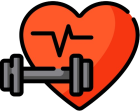
Here, I want to provide some fundamental advice and references on preserving your well-being, healthy lifestyle, and body weight while at home, practicing social distancing.
Regular Weight Monitoring:
Keeping a consistent record of your body weight, whether on a daily or weekly basis, offers valuable insights into any changes, be it weight loss or gain.
Healthy Eating Habits:
Prioritize nutritious meals by starting your day with a balanced breakfast. Opt for meals rich in protein and fiber while minimizing your intake of fat, sugar, and calories. For detailed information on weight-control foods and dietary recommendations, you can explore reputable sources.
Consider Multivitamin Supplements:
When faced with limited access to a variety of vegetables and fruits, incorporating a daily multivitamin supplement into your routine can help ensure adequate nutrient levels. Micronutrients such as vitamins A, B6, B12, C, D, and E, along with minerals like zinc, iron, copper, selenium, and magnesium, play essential roles in supporting your immune system. However, it’s crucial to note that while supplements are beneficial, there is currently no evidence supporting the efficacy of “miracle mineral supplements” in preventing viral infections. In some cases, excessive vitamin intake can have adverse effects on your health.
Hydration and Beverage Choices:
Stay well-hydrated by regularly drinking water. While there is no evidence to suggest that frequent water intake, such as every 15 minutes, prevents viral infections, maintaining hydration is vital for overall health. Additionally, limit your consumption of sugared beverages to promote better well-being.
It’s important to stay informed about health-related practices, and if you have specific concerns, consult with healthcare professionals for personalized advice.

Prioritize Regular Exercise and Physical Activity:
Consider incorporating at-home workouts into your routine or engage in activities like walking your dog or running outdoors. Be mindful of your local situation, staying informed about any restrictions or self-quarantine mandates. Incorporating physical activity is crucial for both physical and mental well-being. You can explore various workout routines that suit your preferences and fitness levels.
Minimize Sedentary Behavior and Screen Time:
While exercise is beneficial, prolonged sitting and excessive screen time pose potential risks to your health. Even individuals who engage in regular exercise may face increased risks of conditions like diabetes and cardiovascular issues due to extended sedentary periods. Consider incorporating breaks from sitting, such as short walks around the office or stretching exercises at home. This not only contributes to overall health but also helps in maintaining energy levels and focus throughout the day.
Prioritize Good Sleep Habits:
Establishing a healthy sleep routine is crucial for supporting your immune system and overall well-being. Aim for seven to eight hours of quality sleep each night. Creating a conducive sleep environment, maintaining a consistent sleep schedule, and practicing relaxation techniques before bedtime can contribute to better sleep quality.
Moderation in Alcohol Consumption:
While staying socially connected is essential, it’s crucial to be mindful of alcohol consumption. Drinking alcohol does not provide protection against viral infections, and excessive calories from alcohol can impact overall health. Moderation is key, and individuals should follow recommended guidelines for alcohol consumption, considering its potential effects on heart health.
Emotion Management:
It’s common to experience a range of emotions, including fear, anxiety, sadness, and uncertainty during a pandemic. Managing stress-related weight gain is vital. Utilize resources provided by reputable organizations, like the CDC, to understand effective stress and coping mechanisms. Strategies may include mindfulness exercises, staying connected with loved ones, and seeking professional support if needed.
Utilize Health Apps for Monitoring:
Consider using health apps to track your movement, sleep patterns, and heart rate. These tools can provide valuable insights into your overall health and help you stay accountable to your wellness goals. Individuals with chronic medical conditions should consult with their healthcare providers for personalized advice tailored to their specific health needs and risks.

Maintaining good health is essential for a fulfilling and balanced life. Being healthy means having the energy and vitality to engage in daily activities, enjoy relationships, and pursue personal goals. It involves adopting a proactive approach to prevent diseases through practices such as regular exercise, a balanced diet, and proper hygiene. Good health not only enhances physical well-being but also positively impacts mental health, contributing to lower stress levels and a reduced risk of conditions like anxiety and depression. Additionally, healthy individuals tend to be more productive, experience increased longevity, and often incur fewer healthcare costs over time. Ultimately, prioritizing health is an investment in overall well-being and a key factor in leading a vibrant and active life.
In a broader context, good health extends beyond individual benefits to positively impact communities and societies. Healthy individuals contribute actively to social and economic well-being, whether through work, volunteering, or supporting others. As a shared responsibility, fostering a culture of health promotes resilience, reduces the burden on healthcare systems, and creates a positive ripple effect that reaches far beyond personal boundaries. Overall, being healthy is a holistic commitment that not only enhances personal fulfillment but also plays a crucial role in building robust and thriving communities.

